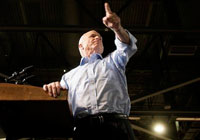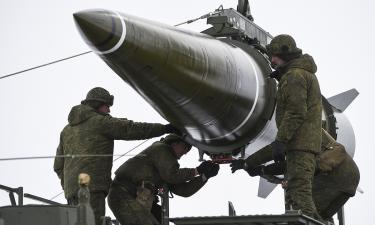John McCain takes one step beyond
Republican presidential candidate John McCain jumped slightly ahead of rival Democrat Barack Obama among U.S. voters according to a new poll, benefiting from his party's convention and a rousing speech by his vice presidential pick Sarah Palin.

Palin, a social conservative who opposes abortion even in case of rape or incest, electrified the party's base at last week's Republican National Convention with a sarcastic, slashing speech that took on Obama. She still faces a major test this week when she gives her first nationally televised interview since McCain chose her as his running mate, instantly elevating the little-known politician to national status.
McCain's rise was expected, since candidates almost always receive a bounce in the polls after their conventions.
The latest The USA Today-Gallup Poll released Sunday shows the Republican moved ahead of Obama 50 percent to 46 percent, suggesting at the very least that McCain has wiped out the seven-point lead Obama received following the Democratic convention a week earlier. The latest poll had a margin of error of plus or minus 3 percentage points.
Also Sunday, McCain's aides said Palin would sit for a television interview. The announcement caps weeks of intense press scrutiny of Palin, who has been accused of having little international experience and exaggerating her reformer credentials.
McCain's campaign has lashed out at coverage of Palin and her family, while Democrats have questioned why the candidate has not been put directly before reporters to answer questions.
McCain campaign manager Rick Davis earlier complained that the media has focused too much on 44-year-old Palin's personal life. Many of those stories came after McCain's campaign announced that Palin's unwed 17-year-old daughter was pregnant.
"Why would we want to throw Sarah Palin into a cycle of piranhas called the news media that have nothing better to ask questions about than her personal life and her children?" Davis said on "Fox News." "So until at which point in time we feel like the news media is going to treat her with some level of respect and deference, I think it would be foolhardy to put her out into that kind of environment."
But, McCain adviser Mark Salter later said Palin has agreed to sit down with ABC's Charles Gibson this week for her first television interview.
Salter also said Palin had not been sent out to campaign on her own because McCain enjoyed the excitement she was injecting into his campaign.
"They're having a good time. We were riding a lot of momentum coming out of the convention. The crowds were large," said Salter. "The senator himself thought they should continue on for a few days."
Meanwhile, McCain tried to distance himself from President George W. Bush and his own party as Obama's campaign pressed its theme that a McCain presidency would offer four more years of unpopular policies.
One of McCain's challenges is to separate himself from the unpopular incumbent. The theme of change was the focus of his speech at the convention, where he promised to end "partisan rancor" - but never mentioned Bush's name.
McCain avoided talking about his 22 years as a Republican senator in Washington in an interview that aired Sunday, saying instead that he would put Democrats in his cabinet and focusing on the fact that he has been at odds with many in his own party on a range of issues from strategy in Iraq to special interest spending.
"Obviously, I was very unpopular in some parts of my own party, whether it be on the issue of climate change or against (former Defense Secretary Donald) Rumsfeld's strategy and the president's strategy in Iraq, or whether it be on campaign finance reform or a number of other issues that I fought against the `special interests,"' McCain said in an interview broadcast Sunday on CBS' "Face the Nation."
McCain supported the Bush administration's decision to attack Iraq, but was an early critic of the way the invasion was handled, and has since supported the so-called "surge," calling it a success.
He was also an early opponent of Bush tax cuts, but has since reversed his stance. He nearly saw his Republican primary campaign derailed by his support of comprehensive immigration reform, which opponents branded "amnesty" for millions of illegal immigrants. He has since tried to make peace with critics in his party by stressing the need for border security before creating a path to citizenship.
There was no free pass from Obama's campaign.
"Voting with George Bush 90 percent of the time isn't being a maverick, it's being the president's sidekick," said Obama campaign spokesman Bill Burton. "The idea that John McCain represents change in Washington is as laughable as his claim that he'll take on the special interests when some of the biggest corporate lobbyists in America are running his campaign."
Obama jumped on McCain's new campaign theme of change, blasting him for choosing Palin, who has been praised as a maverick for taking on corruption in her own party.
McCain's choice of Palin "tells me that he chose somebody who may be even more aligned with George Bush - or (Vice President) Dick Cheney, or the politics we've seen over the last eight years - that John McCain himself is," he said on ABC's "This Week" on Sunday.
Subscribe to Pravda.Ru Telegram channel, Facebook, RSS!





